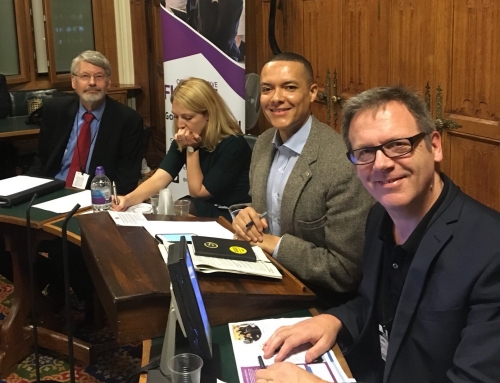Chair Fiona Millar – Chair Comprehensive Future
Speakers –
• Aaron Porter, Vice President, NUS
• Vanessa Everett, Headteacher, Mascalls School, Kent
• Melissa Benn, journalist and Comprehensive Future steering group member
Fiona Millar introduced the meeting and the launch of the pamphlet Ending Rejection at 11 which the campaign has produced in answer to the question raised by successive Secretaries of State sympathetic to ending selection but wanting to know how to do it.
Aaron Porter described the strong correlation between admissions to the selective universities and pupils from selective schools. These young people move on from the ‘bubble’ they exist in schools on to another ‘bubble’ at some universities. If we designed an education system from scratch it would not look like this and it should not be difficult for government to unpick this, to arrive at a system based on equality of opportunity. The effect of rejection on those failing to get into certain schools should not be underestimated. The damaging effect of selection on social cohesion should not be ignored. He expressed his personal support for the campaign and would make the case to the NUS to support it. Later he spoke of his personal experience of being educated at a grammar school and how this has a significant impact of often allowing students to only mix with a narrow cross-section of the population, and is often poor preparation for university and life beyond formal education. This contrasts with the experience of many students that attend comprehensives who not only benefit from a more diverse community, but this also translates to higher achievement at the end of University compared to other students from selective schools with the same A level grades on entry.
Vanessa Everett is head of 1500 pupil non selective school in Paddock Wood and is also an executive head of a small secondary modern in Maidstone, one of the National Challenge schools. She described her first job in a girls’ grammar – again a ‘bubble’, seductive to parents and children. But then when moving on to her real passion, a co-ed comprehensive, she realised what a price everybody was paying to maintain that bubble. She outlined the many costs which result from selection in Kent. The education budget is top sliced to fund the administration of the 11plus; appeals go on through March to August; transport arrangements are extraordinary; qualified teachers are not spread across the system and this is all in addition to the huge costs to the emotional development of pupils. In the previous week the impact of selection had been identified in meetings she had attended. On Monday the symmetry between Kent having 33 grammars and 33 National Challenge schools had been remarked upon; on Tuesday meeting with primary heads one had described how the expected 11 plus results would divide the year 6 overnight between those delighted to have passed (and likely therefore to go on holiday to recompense for holidays missed in summer due to coaching), those who have failed whose parents will strive to lift their spirits and the others who have played no part in the process, having been deemed ‘not grammar’ much earlier on. An interesting and perhaps significant quirk of the effect of selection is that those selected stop working so end up with their attainment lower than average by the end of primary school. Tuesday evening had seen the open evening at the school, with large numbers of parents who really wanted their children to go to the grammars looking at the school as their insurance option, because as a result of outlawing first preference first, parents of able children end up with two choices. On Wednesday the SLT had discussed how the effect of earlier failure, perhaps compared to siblings, brought additional pressure on boys going through puberty. The Kent support for federation and grammar schools sponsoring academies is a fudge which does not get to the root of the problem. Vanessa considered herself fortunate to have been a head under a Labour government which had spent more on schools, but very disappointed in its failure to address selection.
Melissa Benn began her talk by giving an example of the positive effects of the comprehensive principle drawn from her own direct experience. She and her three brothers attended the same local comprehensive and sharing a common schooling to the age of 18 was a very important part of the family’s experience, a solid building block in their lives. Her daughters now have a similar experience in what is now a hugely diverse local area. She said we have a political situation where three main parties (at least publicly) do not see a place for selection in the future but will not do anything to end it. Melissa believes however that it is likely that if there is a Tory government there will be a war within the party as many Tory MPs support selection. The main reason selection has not been ended by the Labour Party in government is fear, because of the power of the lobby supporting selection including the media. We have an Orwellian situation when a government talks about Every Child Matters, National Challenge etc but does not have the political courage to end selection, one glaringly obvious solution. We cannot move forward without the phasing out of selection and we need political leaders who argue passionately for the comprehensive ideal.
Points from discussion
- Staff working with children labeled as failures do an excellent job, trying to raise their self esteem
- Surely division with private schools is more important? ( Fiona responded making the point that private schools cannot be abolished, our focus is on admissions)
- The DCSF does not seem to understand what is going on in selective areas
- In 1965 Michael Stewart, the then Education Secretary, supporting the introduction of comprehensive education said it was absolutely acceptable that parents want the best for their child, as long as it was not at the expense of others.
- If random allocation is introduced, this undermines the ideal of a neighbourhood school
- League tables have been deeply unhelpful in encouraging the pressure on parents to move house
- Primary headteachers who may strongly oppose selection may feel they cannot speak out at their schools are judged on the numbers passing the test
- There needs to be more data on the effect of selection
- In areas of selection some non-selective schools are introducing banding to keep their place in the pecking order
- Many Labour MPs, it seems, cannot see the damage of selection eg millions spent on school transport, many children disadvantaged. Areas which are near selective areas are hugely affected for example Grimsby by neighbouring selective Lincolnshire.
- At the time of the balloting policy being set we were told that marginal seats would be affected, but no real work was done to see if this would affect the vote.
- The book ‘The Spirit Level’ by Wilkinson and Pickett makes clear the damage done by inequality of which selection is a part.


